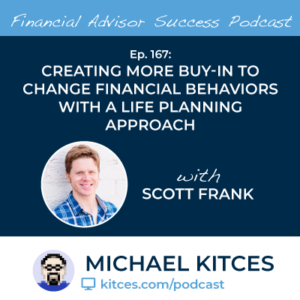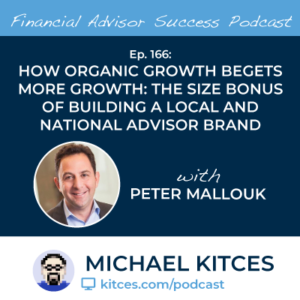Over the past several years, the media has paid plenty of attention to the so-called "Savings Crisis", as a disproportionate number of Americans haven’t saved nearly enough to handle unexpected emergencies, much less generate sufficient cashflow in order to retire. However, there’s a flip-side called the “Epidemic Of Spending”, where retirees who have been frugal for (literally) decades and have diligently saved for their retirements suddenly start spending and even dangerously splurging… potentially to the point of no longer being able to sustain the original retirement goal they so effectively saved for in the first place. Sometimes, such tendencies can be attributed to a desire to ‘just live a little’, but other times, overspending may arise for reasons other than just being faced with the temptation to splurge – for some clients, significant life events can change long-term goals and precipitate dramatic changes in spending habits.
In our 29th episode of Kitces & Carl, Michael Kitces and financial advisor communication expert Carl Richards talk about ways to manage conversations with clients who may be spending at unsustainable levels and are in danger of jeopardizing their own goals, and how important it is to understand why clients may have changed their spending habits in the first place. Notably, the most straightforward path for advisors – simply telling clients that they’re being unreasonable and that they can’t continue spending at their current levels if they want their plan to work – can result in the client simply hiding their spending from their advisor in the first place.
Instead, the importance of connecting the “no” to a bigger “yes” can help clients see a path down from the ‘branches’ of emotional decision-making back to the foundational ‘roots’ laid out in their financial plans – in other words, telling a client they need to reduce their spending should tie to their bigger financial goals that they initially identified were most important to them.
However, it’s also important for advisors to conduct conversations around spending with empathy and objectivity. Because it’s possible that changes in spending behavior are not a result of reckless irresponsibility, but instead a result from a deeper reason, such as a (not-yet-disclosed) terminal illness diagnosis, or the loss of a loved one.
When the cause of erratic spending habits is unknown, advisors can use a three-step process to better understand what may actually be happening in the client’s life that is causing the behavior change. The first step is to restate the fact pattern based on observations made by the advisor and information obtained from the client (e.g., how much is being spent each month; what the initial financial plan goals are/were); step two is to identify the story from the advisor’s viewpoint (e.g., spending at this level will deplete assets by age 70, versus age 95 as originally planned for); and step three is to ask the client to help clarify what’s really happening, offering a safe space for open discussion without judgment.
Ultimately, the key point is that, when clients exhibit unusual spending behaviors, there can be a range of different explanations. And by delving into those reasons with an objective, empathetic approach with a goal of truly understanding any possible mitigating factors, advisors can help clients either get back on track with their original plan or craft new goals to accommodate whatever changing needs they may have.

 Welcome back to the 167th episode of Financial Advisor Success Podcast!
Welcome back to the 167th episode of Financial Advisor Success Podcast! Welcome back to the 166th episode of Financial Advisor Success Podcast!
Welcome back to the 166th episode of Financial Advisor Success Podcast!
